1st IAHR Young Professionals Hydro-Environment challenge
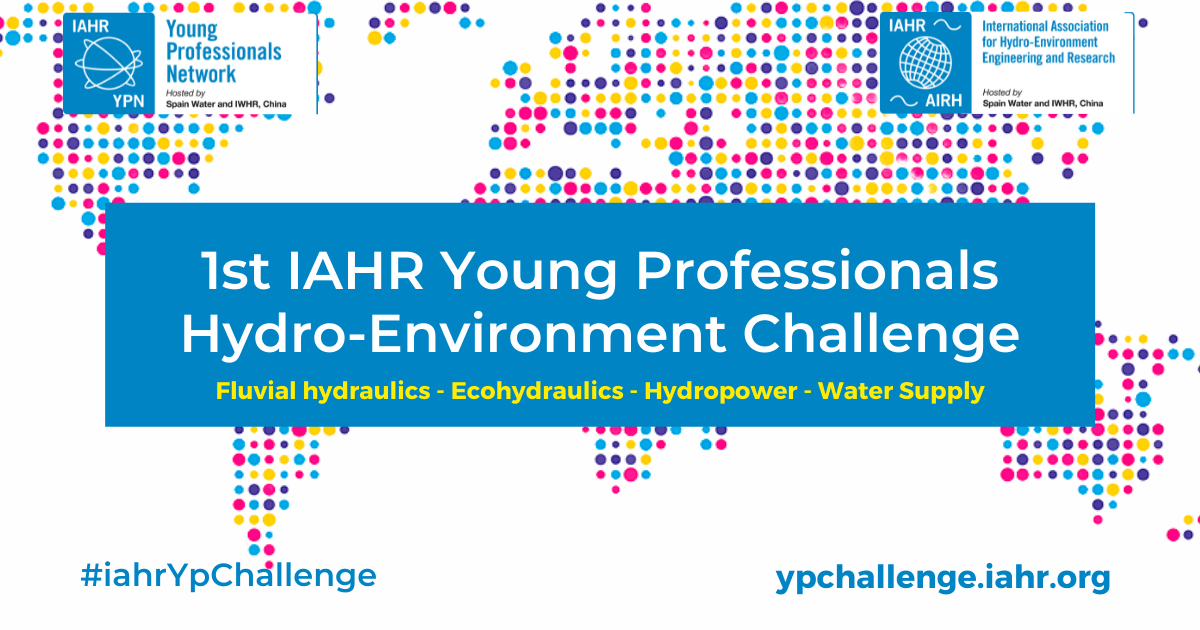
Meet the winners! Main page Participants Defence Session
The IAHR Young Professionals Hydro-Environment challenge seeks to promote international and interdisciplinary collaboration among young professionals and academics working at institutions across the globe in the hydro-environment field. It is an open contest, hence any kind of young professional profile working on any of the IAHR main themes is welcome to take part in the initiative. A number of representative case studies aligned with IAHR themes will be assigned to the participating teams who, after a period of web-based collaborative engineering work, will present their project outcomes during an IAHR webinar to be held in June 2021. A number of project stakeholders, including universities, companies, and public authorities will be involved during the design and mentoring of the case-studies. A jury made up of senior IAHR members and representatives from partners in industry will evaluate the teams.
News
A total of 81 participants registered for the challenge. Registration deadline was 18 February 2021.
Find out the reports from the winning teams:
Group 1: Water Supply challenge. An automatic leakage detection technique by means of WaterGems software.
Group 2: Ecohydraulics challenge. Impacts and mitigation of hydropeaking in Gaula-Lundesokna River.
Group 3: Fluvial Hydraulics challenge. 2D Hydraulic modelling of the Red River (Louisiana - USA).
The award for each of the winning teams will consist on a financial incentive to help covering IAHR membership fees and support Congress registration.
Online forum Session "IAHR Young Professionals Hydro-Environment Challenge Session" Programme Playback
A Meet & Greet session will be organised at the 39th IAHR World Congress in Granada in June 2022
Concept
International and interdisciplinary web-based collaboration.
Open contest, any kind of young professional profile working on any of the IAHR main themes is welcome to join the initiative.
Engineering challenges, case studies aligned with IAHR themes.
Universities and companies are involved in setting up the case studies and providing mentoring to the students.
Project outcomes to be presented during the 1st IAHR Online Forum. 5-7 July 2021
General learning objectives
Upon completion of the challenge, each participant will be able to:
Analyse complex hydro-environmental problems for collaborative engineering.
Use web-based tools.
Defend his or her input on an interdisciplinary team of specialists.
Assess his/her own strengths and weaknesses with respect to working in a group.
Defend the groups' findings in front of a team of experts in the field.
Workload and implementation
Total hour load: 50 hours (equivalent to 2 ECTS)
Workload: 5 hours/week (one half day per week)
Total duration: 8 weeks
Mentoring: two mentors per case-study, for technical support and coaching
Mode: online
Engineering Challenges
Fluvial Hydraulics Challenge
General description: Modelling of river hydraulics with hydropower dams. The task will be to model the river and analyse the hydraulic characteristics with and without the dam. The tool to be used will be HEC RAS 2D.
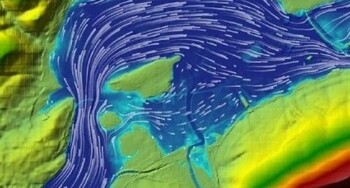 Learning goal: Demonstrate use of engineering models when faced with data limitations associated with historical river condition.
Learning goal: Demonstrate use of engineering models when faced with data limitations associated with historical river condition.Organisations involved: United States Army Corps of Engineers (USACE)
Mentors:
- Technical mentor: David Smith. ERDC - US Corps of Engineers. United States
- 1st coach: Jose Maria Carrillo. Universidad Politécnica de Cartagena. Spain
- 2nd coach: Michael Nones. Institute of Geophysics. Polish Academy of Sciences. Poland
Ecohydraulics Challenge
General description: Heavy hydropeaking in a tributary releasing into a highly protected, unregulated river. The students will assess the effects of the hydropeaking release from an ecological and socio-economic perspective.
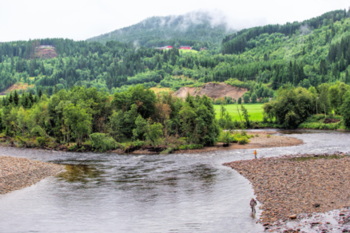 Learning goal: Develop critical thinking with respect to the ecological and socio-economic effects of hydropeaking.
Learning goal: Develop critical thinking with respect to the ecological and socio-economic effects of hydropeaking.Organisations involved: ECoENet and associate partners
Mentors:
- Technical mentors: Roser Casas (Technische Universitat Munchen. Germany), Davide Vanzo (ETH Zurich. Switzerland), Ana Adeva-Busto (SINTEF Energy Research. Norway) and Daniel Hayes (BOKU. Austria)
- 1st coach: Michael Nones. Institute of Geophysics. Polish Academy of Sciences. Poland
- 2nd coach: Maria Bermúdez (University of Granada. Spain) and Eva Fenrich (University of Stuttgart. Germany)
In collaboration with EcoENet
Hydropower Challenge
General description: Hydropower conduit design, protection and operation. The participants will be provided with information from a real hydropower scheme project. They will have to build a hydraulic model to simulate an incident caused by an operating error and improve and protect the original design against hydraulic transients.
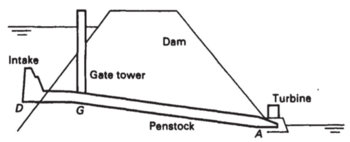 Learning goal: Conceptualize solutions for reliable engineering designs of hydropower conduits.
Learning goal: Conceptualize solutions for reliable engineering designs of hydropower conduits.Organisations involved: Pöyry Energy
Mentors:
- Technical mentor: Miroslav Marence. Poyry.
- 1st coach: David Ferras. IHE Delft. The Netherlands
- 2nd coach: Eva Fenrich. University of Stuttgart. Germany
Water Supply Challenge
General description: The challenge is based on a real water distribution system. The goal is to detect the location of some leaks at a metered area within a specific district. Pressure and flow measurements will feed a hydraulic model, which will be used for the purpose of leakage detection.
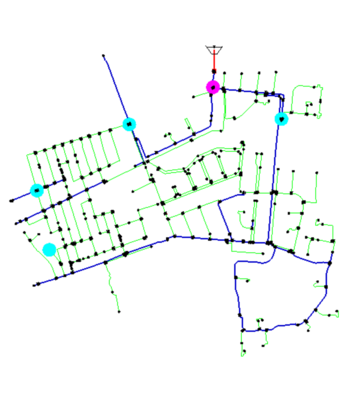 Learning goal: Demonstrate the potential of hydraulic modelling for leakage detection in water distribution systems.
Learning goal: Demonstrate the potential of hydraulic modelling for leakage detection in water distribution systems.Organisations involved: IHE Delft
Mentors:
- Technical mentor: Slavco Velikov. Bentley. United States
- 1st coach: David Ferras. IHE Delft. The Netherlands
- 2nd coach: Jose M. Carrillo. Universidad Politécnica de Cartagena. Spain
Organising committee
David Ferras. IHE Delft. The Netherlands
Eva Fenrich. University of Stuttgart. Germany
José M. Carrillo. Universidad Politécnica de Cartagena. Spain
María Bermúdez. University of Granada. Spain
Michael Nones. Institute of Geophysics. Polish Academy of Sciences. Poland
Michael Tritthart. Institute of Water Management, Hydrology and Hydraulic Engineering (IWHW-BOKU). Austria
Frank Molkenthin. BTU Cottbus-Senftenberg. Germany
Supporting organisations
Afry
Bentley Sustaining infrastructure
EcoENet
ETH Zürich, Switzerland
IHE Delft, The Netherlands
Norwegian Environment Agency, Norway
Sintef, Norway
Technical University of Munich, Germany
United States Army Corps of Engineers (USACE)
Key dates
Call opens: 17 November 2020
Deadline for applications: 18 February 2021
Project starts: 3 May 2021
Project ends. Defenses: Water Supply 24 June 2021 11:00-14:00 h. GMT Fluvial Hydraulics 1 July 14:00-16:00 h. CEST Ecohydraulics 24 June 2021 14:00-16:00 h CEST
Public defense session during the 1st IAHR Online Forum on 8 July 2021. Programme
Session "Meet and Greet" during the 39th IAHR World Congress: To be announced